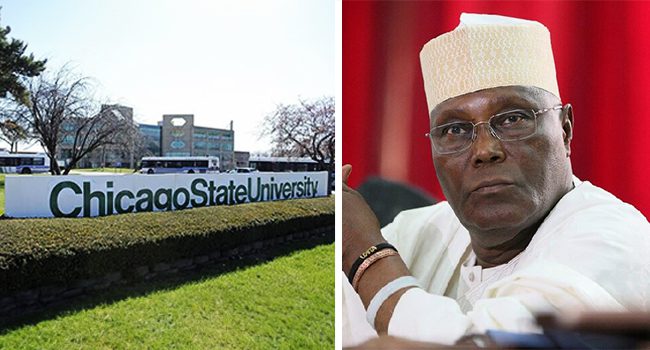Law
Breaking News: U.S. Court Affirms Prior Ruling, Mandates Chicago State University to Disclose Bola Tinubu’s Academic Records within 48 Hours and Testify Under Oath
Legal Proceedings in Atiku v. CSU/Tinubu v. ASCERTA

Abstract: The United States court has rendered a pivotal decision in the case of Atiku Abubakar v. Chicago State University (CSU) and Bola Tinubu, necessitating the release of Bola Tinubu’s academic records and a sworn deposition. This literary analysis delves into the intricate legal arguments and court rulings that have led to this outcome, emphasizing the importance of transparency and due process.
RELATED:
Unprecedented Legal Battle Over President tinubu’s Academic Records Looms
Chicago State University Confirms President Bola Ahmed Tinubu’s Graduation
Introduction: In Atiku Abubakar’s pursuit of justice against Chicago State University (CSU) and Bola Tinubu, the legal arena witnessed a pivotal development as the court upheld Atiku Abubakar’s claims. This article delves into the legal intricacies surrounding this ruling, emphasizing the significance of transparency and adherence to due process.

Background: The legal dispute centred on three crucial prerequisites outlined in the application for discovery: residency, usability, and locus. The intervenors, represented by Bola Tinubu and his legal team, strenuously objected to possession and usability requirements. The intervenors argued that the discovery sought by Atiku Abubakar lacked relevance to the Nigerian proceedings, contending that the issues regarding Tinubu’s educational background were introduced belatedly in Atiku’s reply and thus could not be considered by the Supreme Court of Nigeria.
Atiku’s counsel countered by asserting that the discovery if it unearthed new evidence, could be deemed admissible by the Supreme Court of Nigeria under exceptional circumstances as stipulated in the Nigerian Electoral Act of 2022. The court concurred with Atiku’s lawyers, emphasizing that admissibility was not a prerequisite for ordering discovery. The court’s primary concern was the relevance of the requested information to the foreign proceeding and the practical capacity to incorporate it.
Interest of Atiku Abubakar: The court dismissed the argument that Atiku Abubakar was not an interested party due to the late introduction of the issue, departing from the rigid position held in the Tsamani case. The court ruled that the issue’s belated introduction qualified it as having been raised and established Atiku Abubakar’s status as an interested party.
Scope of Discovery: Subsequently, the court reviewed Atiku Abubakar’s narrowed document requests, which primarily concerned Bola Tinubu’s CSU diplomas, the authenticity of these diplomas, any similar diplomas issued by CSU to other individuals, and the Orr documents purportedly certified by CSU’s Associate General Counsel, Jamar Orr. Furthermore, the court scrutinized Atiku’s request for a deposition under oath, aiming to confirm various aspects, including CSU’s stance on the authenticity of documents and the circumstances surrounding their certification.

Privacy Objections: Bola Tinubu’s legal team raised privacy objections, citing laws that designate educational records as private. They argued that a deposition was unnecessary since CSU had already submitted an affidavit confirming Tinubu’s graduation in 1979. However, the court disagreed, highlighting that the core issue was the authenticity of the CSU diploma presented to the INEC by Tinubu.
FERPA Statute: Addressing FERPA (Family Educational Rights and Privacy Act), the court clarified that FERPA does not establish an independent privilege for educational records but rather designates them as confidential. Disclosure is permitted under FERPA if compelled by a lawfully issued subpoena or judicial order, with the onus on the requesting party to demonstrate the outweighing of their interest in obtaining the records over the student’s privacy.
Balancing Interests: The court determined that Atiku Abubakar’s interest in obtaining Bola Tinubu’s records outweighed Tinubu’s privacy rights, mainly because Tinubu had put his diploma at issue by submitting it to INEC. Moreover, Tinubu had submitted other educational documents in a related Nigerian proceeding, some of which were certified by a CSU official.
The burden on CSU: Bola Tinubu’s legal team also argued that the discovery would impose an undue burden on CSU. However, the court dismissed this argument, asserting that CSU was the proper party to make such claims. Additionally, the court overruled CSU’s preference for written deposition, emphasizing that an oral deposit was the most influential information source.
Court’s Order: In its concluding order, the court-mandated CSU to release all relevant documents within 48 hours, with the deposition to follow immediately after document release, even if it necessitated weekend work.

Conclusion: This legal development underscores the importance of transparency and adherence to due process in legal proceedings. The court’s decision favouring Atiku Abubakar exemplifies the pursuit of justice and upholding principles in a fair and just legal system. It serves as a testament to the integrity of the U.S. judiciary and emphasizes the significance of a judicial system that operates in the pursuit of substantive justice.
Disclaimer: This article provides an academic analysis of the legal proceedings and does not represent an endorsement of any party or individual involved in the case.
By: Stella C. Akupue.
Click Button Below to Join Our Telegram Groups

For Advert Inquiries & News/Article Publishing
Call:+2348033888791, +2347069999005
E-mail: legalattorneyblog01@gmail.com





















